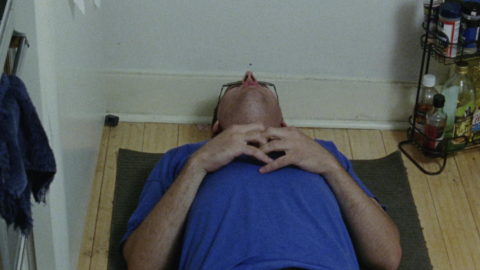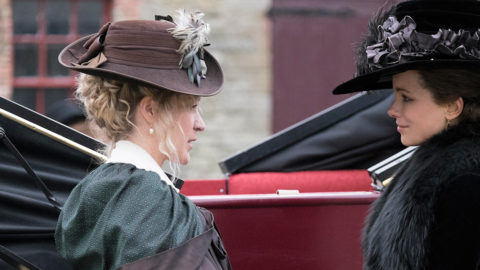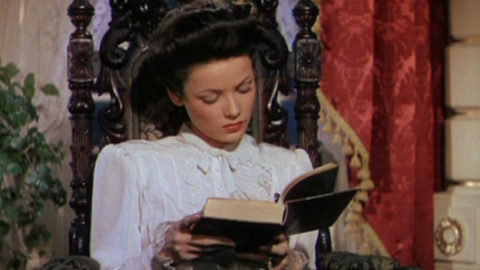Film of the Week: Classical Period
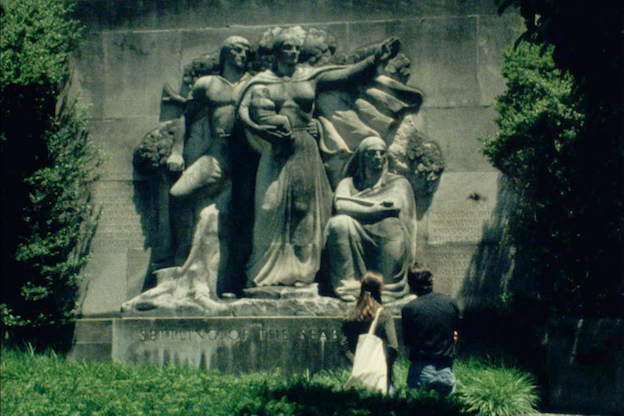
Ted Fendt’s second feature, the hour-long Classical Period, begins with a man reading out a description of life in Florence in Dante’s day. He describes “one universal bout of uninterrupted anarchy,” scenes of gruesome and relentless violence. And yet the world depicted in Fendt’s film couldn’t be any more bloodless or less anarchic. The descriptions are from a 19th-century book by Henry Napier, Florentine History; it’s being quoted by the leader of a seminar attended by the main characters of Fendt’s film, who are Dante devotees. All three of them speak in uninflected droning voices—which is perhaps not unusual in U.S. independent cinema these days, but even by normal standards, there’s something so insipidly nebbishy about Fendt’s characters that you almost want to tear the books out of their hands and insist they go to the gym, or take a long walk, or go and see a Transformers movie or something, just come down from the lofty empyrean they inhabit.
English-language culture these days, in the cinema or elsewhere, has become so anti-intellectual that it feels like nothing less than a radical gesture to make a film about people who are seriously devoted to bookish, cerebral pursuits. Such people are bound to look admirable, even noble to some degree—and you can admire them even if you’d also like to slap them. Classical Period never really lets us know whether or not it’s presenting its characters as legitimately slappable—and there are points at which they’d clearly like to slap each other. I haven’t seen Fendt’s previous work—a series of shorts and another short feature entitled Short Stay (2016)—so I can’t be confident about the precise type and degree of irony with which he frames his characters. He’s an avowed admirer of Straub and Huillet, and it may be that he’s simply filming people he knows, presenting them as neutrally and uninflectedly as possible, showing them as they actually are. But if this is how Fendt’s actors really are, I’d find their company in real life even more uncomfortable than it is on screen. Nevertheless, their intellectual absorption—which isn’t the same as self-absorption, although it’s often close—is such an anomaly in contemporary cinema that you can’t help being intrigued by it, even mesmerized at times.
Classical Period, largely speaking, consists of a series of sequences (there’s no narrative per se) in which three youngish people, together with the occasional friend, teacher, or peer, hang out in Philadelphia and talk learnedly and at length about archaic and esoteric topics, largely to do with history, the classical tradition, and religion, mainly Catholic. It should be said that they expound rather than actually debate; by and large, it’s about displays of erudition rather than exchanges of ideas, although once in a while, a flash of brilliance emerges. I can’t think of a better illustration for the notion of free will than the example used by one of the trio, Cal: the slogan “Right Way Up” on a box—a recommendation rather than an unconditional instruction.
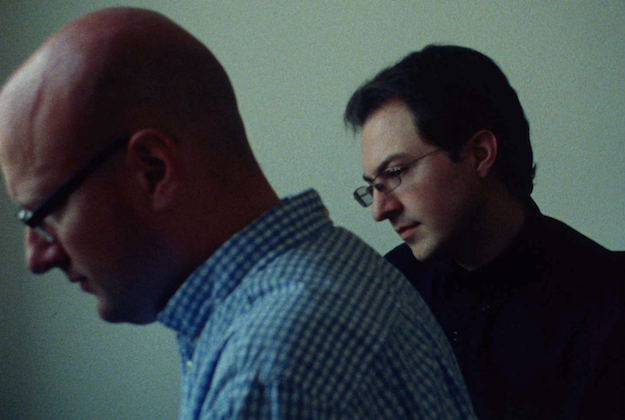
It’s not clear whether these people are actually students, graduates, or young academics. It’s never apparent that any of them have jobs. They’re simply scholars, seekers after wisdom, knowledge junkies—the sort of people who might in another age have sat round in olive groves furrowing their brows and occasionally interrupting inopportunely while Socrates held his symposia. The level of articulacy and erudition here is such that it makes your average Whit Stillman character look downright thuggish. These are people who speak in paragraphs. Very long paragraphs. With footnotes.
One of the trio is a young woman named Evelyn (Evelyn Emile), who has the flattest diction of the three, and who doesn’t seem to derive much joy from her erudition: as she complains in one scene, she suffers from acute insomnia, for which the only relief seems to be her small-hours reading of Denise Levertov’s poetry. And she adds—as if this were somehow shocking—she reads the poetry not in order to write about it, just to have something to read. Her co-scholar Cal (Calvin Engime) doesn’t seem to have such problems, although some might consider him to be a walking cure for insomnia; he’s not so much a know-all as a man who simply knows all things, and likes nothing more than dispensing his wisdom. He’s shameless at trumping others with his erudition: when a friend offers some arcane knowledge about historical attitudes to pharmaceuticals, he’ll come in with, “I’ve actually been reading a medieval grimoire,” followed by a discourse in how people in 8th-century Constantinople laid great store by talismans of Alexander the Great. There’s a moment in a bookshop when Cal starts reciting a passage, in a ripely theatrical English accent, from The Renegado, by Jacobean dramatist Philip Massinger. “Hm yeah,” says Evelyn. “I’ve never heard of it,” then asks him if he’s going to buy it. He replies, “I already have a copy at home”—and you think, but of course he does.
Engime’s performance as Cal is one of the most striking I’ve seen this year—if, indeed, it is a performance and he’s not just being himself in front of the camera. Cal the character is of course a performer in his ability to hold forth unstoppably—one speech from him, and you can imagine how it must feel to be stuck in a lift with George Steiner. But Engime’s renditions of Cal’s wisdom are, quite simply, virtuoso. There’s an extraordinary scene in which he drones on, sometimes in numbing detail, sometime quite fascinatingly, about the English Reformation martyr Edmond Campion, with little wry asides in which he rather self-gratifyingly signals his amusement (i.e. about the fact that the Bishop of Lincoln at this period was called Dick Cheney), and you suddenly realize that Engime has been talking without pause for breath for a single-take seven minutes. But Cal does have a habit of holding forth at length, and seminar leaders will occasionally deflate him, to neatly comic effect, with a terse “Thank you, Cal.”
Fendt has spoken in an interview about how, in films set in an academic milieu, actual learning seems only to take place in brief interludes between other more worldly business, like teachers seducing students. In Classical Period, that schema is inverted, so that the erudition is all, while what usually constitutes real life is relegated to a subsidiary place, even excluded entirely. You can’t imagine any of these people having either time, mental space, or the inclination for love lives. When daily life at its most mundane intrudes, the effect is startling: you almost want to cross yourself, or sniff salts, when someone says, “Folks, I’m gonna get some more beer.”
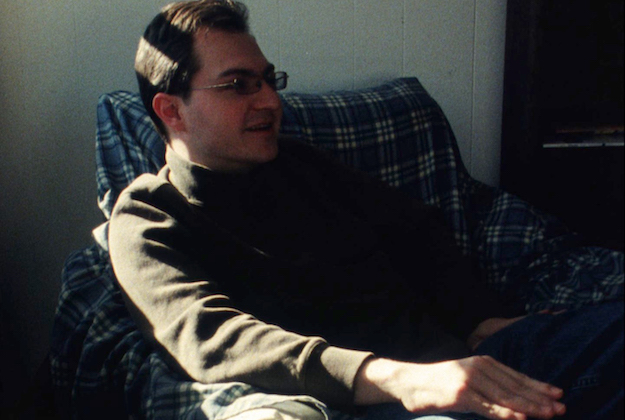
It’s a great film of non sequiturs. There’s a lovely moment when Cal starts talking about how names on a poster for Rigoletto have been replaced with “Dan Greenberg,” but he’s interrupted by a doorbell ringing—and he definitely seems to be a man who doesn’t appreciate interruptions. He’d rather give himself entirely and unconditionally to study, as in an artfully lit and composed shot (the DP is Sage Einarsen) where he’s seen at a table writing, his arm improbably—and, one would imagine, uncomfortably—propped on a pair of large volumes, so that he seems to be posing knowingly for a Renaissance portrait of a scholar. It’s a brief shot—but you can imagine him being positioned thus for hours.
The film takes its title, apparently, from a sequence in which a character—following a recital of an early Beethoven piano trio—explains how this phase of the composer’s work signals a shift from the classical to the Romantic period in music. It’s hard to imagine the director of a film like this ever shifting into a Romantic mode, but then we’re so comprehensively glutted with Romanticism in cinema, and ever have been, that a film shot and edited this sparely, this focused on word and idea, this comprehensively filleted of narrative, always comes across as at the very least a palate cleanser, a long icy draft of classicism. Classical Period is also sparely funny—at least I think it is, whether intentionally so or not. Tell me you can look at Engime’s Cal squinting in the sunlight at a local building of historic interest, or the final shot of him looking terribly pleased with himself after he’s made a comment about Cato, and tell me you don’t crack up. And if you can manage to tell me without quoting Boethius or some other antique authority on the consolations of humor, so much the better.
Jonathan Romney is a contributing editor to Film Comment and writes its Film of the Week column. He is a member of the London Film Critics Circle.



